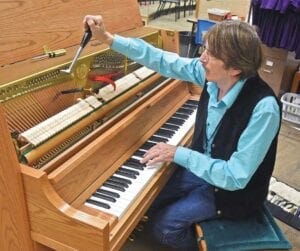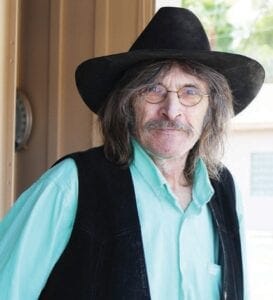Here’s a special bonus edition of Slouching Towards McDonaldland, a story I did back in early 2021 about a piano tuner. This is one of my favorite stories I’ve done and some of my best writing. This is where I felt like I got my fastball back after my mother died.
Over the course of a 38-year career, Herreid, S.D.- native Blaine Lutz has tuned over 15,000 pianos. Beyond the usual suspects of pianos in schools, churches and private residences, Lutz has also tuned pianos for a who’s who of popular music, including Judy Collins, Joan Baez, The Eagles, Johnny Cash, Bob Dylan, George Jones, Statler Brothers and many others.

But there was one piano, a black 41-inch Steinway, that gave him pause.
It was a secondhand piano, one marked with the memories of the previous owner: cigarette burns on the left and right cheek blocks, stains from drinks that had been placed by the lid and a sustain pedal with a cover worn from use.
John Lennon had once owned the piano and Sandy Dejoras won the piano in a contest put on by the record company to promote “Double Fantasy,” the final album Lennon released before his murder on Dec. 8, 1980 in New York City, just outside The Dakota, the building where the 40-year-old Lennon lived with his wife, Yoko Ono and their son, Sean.

According to Lutz she traveled all the way to MinneapolisMinn. to buy a stack of entry forms. She told her friends, “I’m going to win this piano.”
Lennon’s piano went from The Dakota to the Dakotas and three weeks later Dejoras, the wife of a doctor, rang Lutz and asked him to tune the piano.
“So I went to Wishek. And you know these doctors, they’ve got beautiful houses,” Lutz said.
He walked into the room where the piano was kept, there were speakers in the walls and huge posters depicting The Beatles. Below that was the piano. Lutz said he almost lost it, how many people get the opportunity to tune John Lennon’s piano?
“So I open up the lid and started tuning the piano and I played ’Hey Jude’ on there,” Lutz said
A month or two after he tuned the piano, he received another call from Dejoras about the piano. This time around she wanted Lutz to sell the piano for her. So Lutz borrowed a book from the Bismarck Civic Center —today known as the Bismarck Event Center — listing the managers of various rock bands and began making calls about selling the piano.
It proved to be something of an albatross for Lutz. He made the mistake of calling Tony King, then manager of The Rolling Stones. King had also served as manager for Lennon. He was apoplectic at the thought of the instrument being sold.
“He said ’You are not going to drag John Lennon under the mud like they did Marilyn Monroe. If you make one dollar over the retail price of that piano, Yoko’s gonna sue you in New York,’” Lutz said.
He reached out to his lawyer in Bismarck about the matter.
“I said, ’Hey, I don’t know what to do.’ He said ’I’m going to type a letter to Tony King and I’m going to send it to him and he’s going to have 30 days to respond,’” Lutz said. “And well, he never responded so he said, ’Go ahead, Blaine, do it, just go out and sell it.’ So I put ads in Rolling Stone.”
Dejoras wanted $3.5 million for the piano, but the highest offer Lutz received was for $350,000 and the instrument never sold.
“I worked on this project for six, seven months trying to get that piano sold,” Lutz said.

Lutz was no stranger to selling pianos, that’s how he got his start in the music business. He sold pianos for the Wylie Music Company, covering the territory that spanned from Bismarck to Miles City, Mont.
There was plenty of on the job learning for Lutz. As a salesman, he learned about the inner-workings of the instrument and he would dial up the Wylie Music Company’s piano technician, Lloyd Robertson, when he needed further guidance.
Robertson was a larger-than-life character. A man who kept a cigar or pipe between his teeth and let the hot ash burn holes in shirt. A blind man who tuned by touch and ear, a musical figure straight from the myths and legends of the blues, a mentor more Mississippi Delta than Montana or Dakotas.
Robertson inspired Lutz to make a career change. He spent a year under Robertson’s tutelage learning the craft of tuning pianos.
“He had an old upright piano in his garage and he would break stuff and ask me to figure it out. Isn’t that beautiful?” Lutz said.
Robertson’s acute hearing made concerts an unpalatable experience, he would hear a squeak that others with less discerning ears would not notice.
“He never went to a concert,” Lutz said.
Lutz’s big break came when he tuned the instrument of classical pianist Ruth Laredo for a performance in Bismarck. Tuning for an artist of Laredo’s stature was nerve-racking for Lutz, particularly in light of the fact that Laredo had walked off the stage at a performance in Atlanta because she was not pleased with how her instrument had been prepared.
That was when Lutz heard the words he had longed to hear from his mentor.
“You’re ready,” Robertson said.
And he was right. Lutz soon became the piano tuner of choice for the Bismarck Civic Center.
On show days, Lutz would come in an hour before he was due to tune. He would sit in a chair in the front row and just listen to the amplifiers and piano as a way of adjusting his ears to particular acoustics of that performance. Properly tuning a piano requires patience and time.
“It takes a good hour to an hour and a half when you do it by ear,” Lutz said.
The time requirement is why tuning for Bon Jovi proved to be one of his more challenging events at the Civic Center.
Lutz was following his normal performance day routine when the promoter approached him and informed him that a snowstorm near Denver, Colo. had delayed the arrival of the semi hauling the New Jersey glam metal quintet’s instruments.
“How much time do you need?” the promoter asked.
“Give me an hour,” Lutz said.
“You’ve got 40 minutes,” the promoter replied.
Along with the shorter runway, Lutz faced another challenge: the temperature. Due to the frigid conditions of the trek from the Mile High City, parts of the piano were framed in frost.
Lutz was unfazed, his mentor had told him he might someday confront a challenge like this.
“The blind man told me ‘Hey Blaine, you’re going to run into something and you have to understand, you have to do the best you can,’” Lutz said.
With the assistance of a heat lamp and his training, Lutz was able to get the piano tuned.
“I put on the headphones and we made it through it,” Lutz said.
The band arrived in the Civic Center in a black limousine and shook Lutz’s hand. After the soundcheck, the band was ready.
When Emmylou Harris played Bismarck, Lutz recalls the singer donning a wig so she could do her laundry incognito.
One time, Lutz was on stage working on a piano when in walked Bob Dylan, flanked by two security guards.
“It was almost like he was a president,” Lutz said.
Dylan approached him and gave him a bump with his knuckles, a sign of approval from the sometimes mercurial Dylan.
Regardless of the name on the marquee, Lutz is always excited to do his job.
“You know, my heart pumps when I get on that stage, no matter what band,” Lutz said.
These days, Lutz is living in Congress, Ariz, and though technically retired, he still tunes pianos for those who ask, but these days is more selective about that due to the pandemic.




